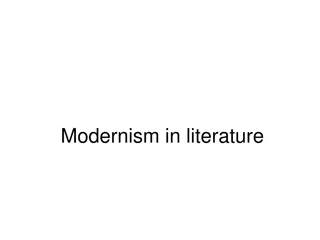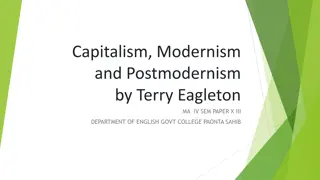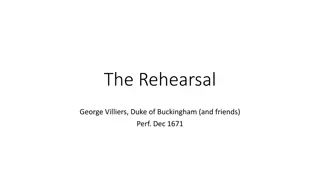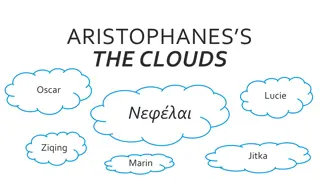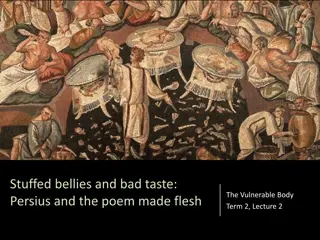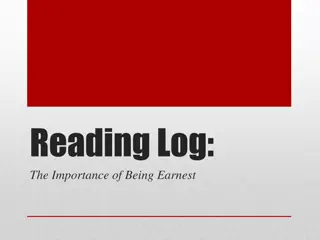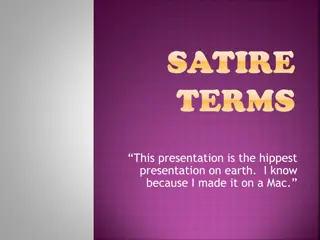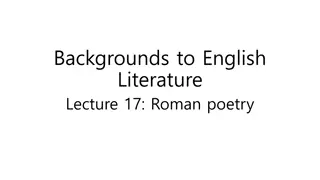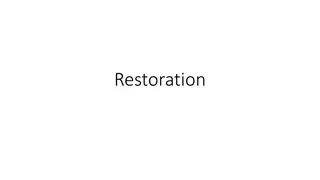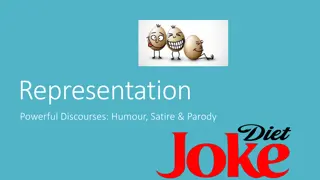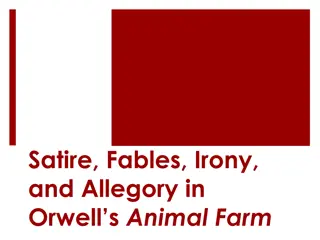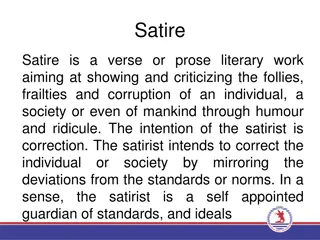Exploring the Art of Satire in Literature
Delve into the world of satire, a literary device that combines humor and criticism to target human flaws and societal issues. Uncover the origins, major types, and key devices used in satire, as well as its significance in critiquing and improving human institutions and behaviors. Understand how satire can range from playful to scornful, and learn to identify and analyze satirical elements in written works.
Download Presentation

Please find below an Image/Link to download the presentation.
The content on the website is provided AS IS for your information and personal use only. It may not be sold, licensed, or shared on other websites without obtaining consent from the author. Download presentation by click this link. If you encounter any issues during the download, it is possible that the publisher has removed the file from their server.
E N D
Presentation Transcript
Satire Review "Satire is a sort of glass, wherein beholders do generally discover everybody's face but their own --Jonathan Swift Methods Madness Major players
Learning Goal (paraphrase it) Students will be able to identify satirical devices and origins in written satirical pieces and analyze the purpose of these devices in critiquing society.
Scale- Pre-unit score 4: I know absolutely nothing about satire, but I do know that these ridiculous scales completely and thoroughly can assess how much knowledge I possess about a subject and therefor help my teacher tremendously in her planning for future instruction with a simple thumbs up or thumbs down .
Scale continued 3: Who said anything about sarcasm? I am being dead serious here. This is important! We must know and fully understand it to be better members of society.
Scale continued 2: I am not sure whether or not I should be offended by the implication that my teacher is making that real learning is only defined by a 4-point scale.
Scale continued 1: I am confused. Is this supposed to be serious? What are satirical devices? 0: I am a literalist.
Satire A literary manner that blends a critical attitude with humor and wit for the purpose of improving human institutions or humanity. (Holman) Satire (n.) - A literary work in which human vice or folly is attacked through irony, derision, or wit.
Two major types of satire: Formal" or "direct" satire speaks directly to the reader or to a character in the work; Indirect" satire relies upon the ridiculous behavior of its characters to make its point. Satire may be lighthearted and playful or scornful and bitter. The tone depends largely on the particular subject and its author s intentions.
Four Devices of Satire Exaggeration: To enlarge, increase, or represent something beyond normal bounds so that it becomes ridiculous and its faults can be seen. Incongruity: To present things that are out of place or are absurd in relation to their surroundings. Reversal: To present the opposite of the normal order (e.g., the order of events, hierarchical order). Parody: To imitate the techniques and/or style of some person, place, or thing.
Exaggeration To enlarge, increase, or represent something beyond normal bounds so that it becomes ridiculous and its faults can be seen Example: Scary Movie exaggerates techniques used in horror films to scare audiences.
Incongruity To present things that are out of place or are absurd in relation to its surroundings. Example: A toaster as a time machine in parody of Simpson s Sound of Thunder ; Hitchhiker s Guide to the Galaxy OR
Reversal/ Irony To present the opposite of the normal order (can be situational or verbal irony) sarcasm Example: On Family Guy, Stewie acts like an adult.
Parody- Most common today To imitate the techniques and/or style of some person, place, or thing Example:
More Satiric Devices Caricature: refers to the technique of exaggerating for comic and satiric effect one particular feature of the target, to achieve a grotesque or ridiculous effect. Seen more in visuals than in writing. Burlesque - This type of satire is often "lowly" or "non-literary" but takes on a sophisticated manner. For example, to have a king speak like an idiot or a workman speak like a king
Burlesque Device Mock Heroic- a form of burlesque satire that mocks heroic language of classics by discussing a less-than-epic subject matter with elevated language: i.e. Pope s Rape of the Lock
More Satiric Devices Invective: describes very abusive, usually nonironical language aimed at a particular target (e.g., a string of curses or name calling). Invective can often be quite funny, but it is the least inventive of the satirist's tools. A lengthy invective is sometimes called a diatribe. The danger of pure invective is that one can quickly get tired of it, since it offers limited opportunity for inventive wit.
More Satiric Devices Lampoon: generally refers to a very harsh and personal attack on a very particular recognizable target, focusing on the target's character or appearance. Reductio ad absurdum: When the author (speaker) takes the side of the argument he wishes to ridicule by over exaggerating the attitude or assumptions, which thus exposes the foolishness of them. Swift s favorite technique, it may be hard to spot.
Other Literary Elements in Satire Irony (verbal, situational, dramatic) Hyperbole Stock characters/ Archetypal Humor Sarcasm Understatement
Verbal Irony Your boyfriend shows up in ripped up jeans and a stained t- shirt. With a smirk, you say, "Oh! I see you dressed up for our date. We must be going to a posh restaurant."
Dramatic Irony In Shakespeare s play Romeo and Juliet, the audience knows about the plan Juliet and Friar Laurence have for Juliet to take the sleeping potion. However, Romeo is not informed of the plan and drinks poison himself.
Origins of Satire Juvenalian - Taking its name from the writer Juvenal, Juvenalian satire typically is a harsh attack on its target. Horatian - Taking its name from the Roman writer Horace, Horatian satire is identified by its tendency to make the observer or reader laugh. It is marked with wit and is not always a direct attack on its target. Satire s Golden Age was the 1700s when it became popularized by poets, playwrights, and novelists- used to critique the wealthy and societal religious norms
I have never made but one prayer to God, a very short one: 'O Lord, make my enemies ridiculous.' And God granted it. Voltaire
Examples from The Onion See handouts
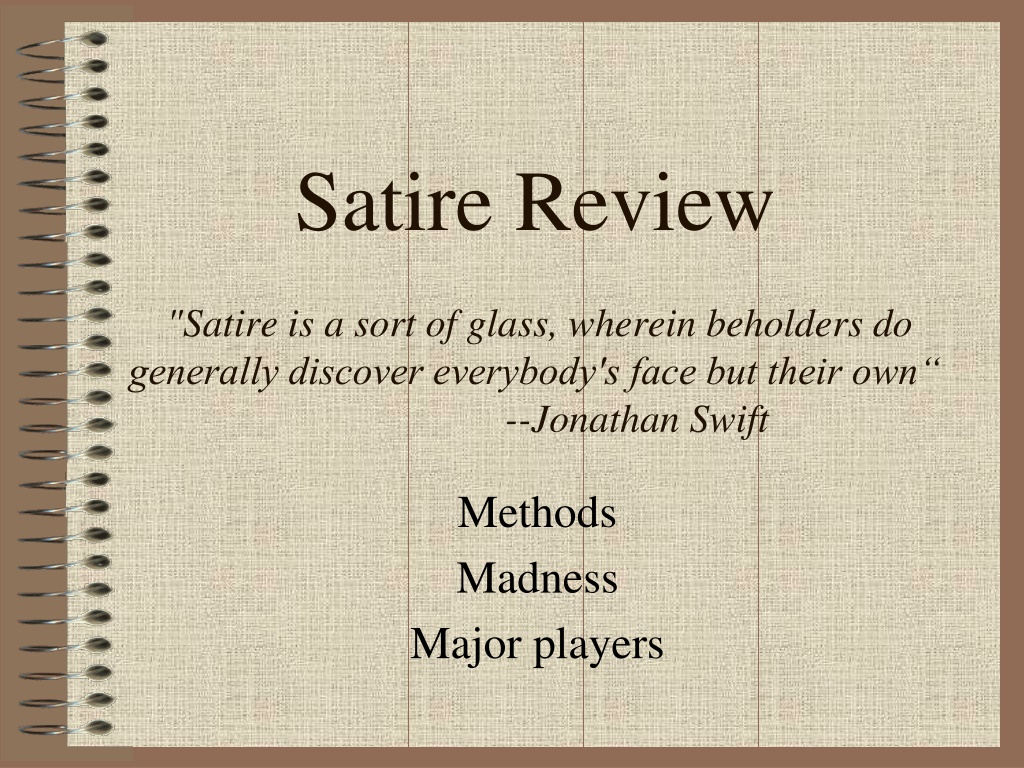

![[PDF⚡READ❤ONLINE] In Ruins: A Journey Through History, Art, and Literature](/thumb/20543/pdf-read-online-in-ruins-a-journey-through-history-art-and-literature.jpg)

